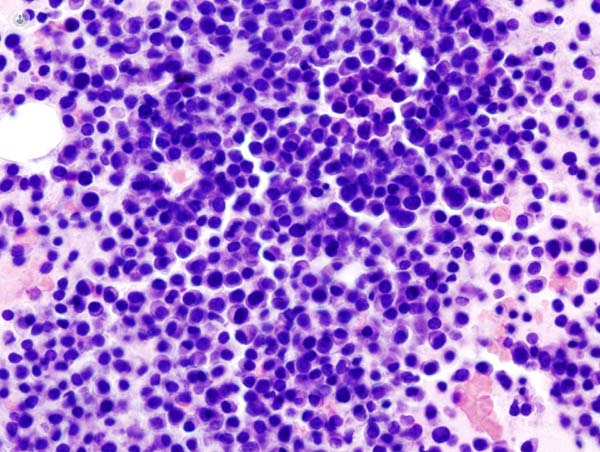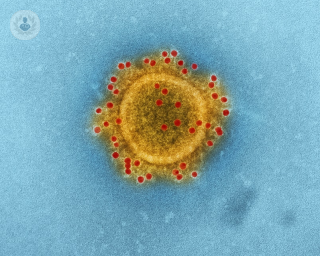What is multiple myeloma?
Multiple myeloma is a type of cancer that affects plasma cells, a type of white blood cell responsible for producing large volumes of antibodies to fight infections. Myeloma starts with a malignant plasma cell in the bone marrow (the spongy centre of bones where blood cells are produced from the body’s natural stem cells).
The cancer divides and multiplies until it crowds out the healthy blood cells. It produces abnormal proteins instead of antibodies, which cause complications and leave the patient more vulnerable to infection.
It is known as multiple myeloma because the cancer frequently affects multiple parts of the body, for example, the spine, skull, ribs and pelvis.

What are the symptoms of multiple myeloma?
The main symptom of multiple myeloma is bone pain, most commonly in the spine and ribs. Other symptoms include:
- Fragile bones that break easily.
- Tiredness, weakness, palpitations, dizziness, shortness of breath – these are all symptoms of anaemia caused by the myeloma blocking the production of red blood cells in the bone marrow.
- Repeated infections – the immune system is impaired by the myeloma blocking the production of healthy white blood cells in the bone marrow and producing abnormal proteins instead of antibodies.
- Weight loss.
- Unusual bruising or bleeding.
Causes of multiple myeloma
It is not clear what causes multiple myeloma; however, several risk factors have been identified:
- Age – most patients are diagnosed in their mid-60s, while it is almost unheard of under the age of 40.
- Gender – it is more common in men than women.
- Race – multiple myeloma is around twice as common in black people as white or Asian populations.
- Family history – people whose close relatives have been diagnosed with multiple myeloma have a higher risk of developing the condition themselves.
- MGUS (monoclonal gammopathy of unknown significance) – this relatively benign condition appears to be associated with the development of multiple myeloma. MGUS involves an excess of proteins called immunoglobulins in the blood. It doesn’t cause symptoms and doesn’t require treatment; however around 1% of people with MGUS go on to develop myeloma.
Can it be prevented?
There is no way to prevent multiple myeloma, but the earlier it is detected, the most effectively it can be treated. It is recommended that patients with MGUS have regular screenings for multiple myeloma for this reason.
What is the treatment for multiple myeloma?
Most cases of multiple myeloma can’t be cured; however research is ongoing to find new treatments. Current treatments can help to control the condition and manage the symptoms.
Treatment options include:
- Anti-myeloma medication to destroy the myeloma cells and control relapses.
- Chemotherapy
- Radiotherapy
- Biological therapy
- Corticosteroids
- Bone marrow transplant
A haematologist treats multiple myeloma.
03-12-2013 10-02-2023Multiple myeloma
Dr Michael Potter - Haematology
Created on: 03-12-2013
Updated on: 10-02-2023
Edited by: Aoife Maguire
What is multiple myeloma?
Multiple myeloma is a type of cancer that affects plasma cells, a type of white blood cell responsible for producing large volumes of antibodies to fight infections. Myeloma starts with a malignant plasma cell in the bone marrow (the spongy centre of bones where blood cells are produced from the body’s natural stem cells).
The cancer divides and multiplies until it crowds out the healthy blood cells. It produces abnormal proteins instead of antibodies, which cause complications and leave the patient more vulnerable to infection.
It is known as multiple myeloma because the cancer frequently affects multiple parts of the body, for example, the spine, skull, ribs and pelvis.

What are the symptoms of multiple myeloma?
The main symptom of multiple myeloma is bone pain, most commonly in the spine and ribs. Other symptoms include:
- Fragile bones that break easily.
- Tiredness, weakness, palpitations, dizziness, shortness of breath – these are all symptoms of anaemia caused by the myeloma blocking the production of red blood cells in the bone marrow.
- Repeated infections – the immune system is impaired by the myeloma blocking the production of healthy white blood cells in the bone marrow and producing abnormal proteins instead of antibodies.
- Weight loss.
- Unusual bruising or bleeding.
Causes of multiple myeloma
It is not clear what causes multiple myeloma; however, several risk factors have been identified:
- Age – most patients are diagnosed in their mid-60s, while it is almost unheard of under the age of 40.
- Gender – it is more common in men than women.
- Race – multiple myeloma is around twice as common in black people as white or Asian populations.
- Family history – people whose close relatives have been diagnosed with multiple myeloma have a higher risk of developing the condition themselves.
- MGUS (monoclonal gammopathy of unknown significance) – this relatively benign condition appears to be associated with the development of multiple myeloma. MGUS involves an excess of proteins called immunoglobulins in the blood. It doesn’t cause symptoms and doesn’t require treatment; however around 1% of people with MGUS go on to develop myeloma.
Can it be prevented?
There is no way to prevent multiple myeloma, but the earlier it is detected, the most effectively it can be treated. It is recommended that patients with MGUS have regular screenings for multiple myeloma for this reason.
What is the treatment for multiple myeloma?
Most cases of multiple myeloma can’t be cured; however research is ongoing to find new treatments. Current treatments can help to control the condition and manage the symptoms.
Treatment options include:
- Anti-myeloma medication to destroy the myeloma cells and control relapses.
- Chemotherapy
- Radiotherapy
- Biological therapy
- Corticosteroids
- Bone marrow transplant
A haematologist treats multiple myeloma.


Paraprotein in the blood: is it a sign of cancer?
By Dr Jonathan Sive
2024-11-21
Some people make an abnormal amount of protein in their blood or urine, which is known as a paraprotein. We've asked one of our top blood specialists Dr Jonathan Sive how it is detected and whether it's an early sign of cancer. See more


Immunodeficiency: an in-depth explanation
By Dr Ricardo Jose
2024-11-21
Immunodeficiency occurs when the immune system suffers impairment and, as a result, cannot function properly. In our latest article, we spoke with esteemed pulmonologist, Dr Ricardo Jose, to learn more about this immune-system-threatening condition. See more


How has myeloma treatment improved over the last few years?
By Dr Jonathan Sive
2024-11-20
Myeloma, a type of blood cancer, has seen major advances in treatment in recent years, with patients living longer and with a better quality of life. We interviewed Dr Jonathan Sive, an expert haematologist who works at the forefront of myeloma treatment, for an inside look at the latest treatments available. See more


What is multiple myeloma?
By Dr Santhosh Narat
2024-11-12
Cancer can strike almost anywhere in the body – even our blood can turn against us. Multiple myeloma is a common type of blood cancer. How does this disease affect our bodies and can it be treated? We turned to esteemed haematologist Dr Santhosh Narat for answers. See more
Experts in Multiple myeloma
-
Dr Michael Potter
HaematologyExpert in:
- Leukaemia
- Lymphoma
- Multiple myeloma
- Myeloproliferative disorders
- Hodgkin's lymphoma
- Anaemia
-
Dr Salim Shafeek
HaematologyExpert in:
- Leukaemia
- Lymphoma
- Multiple myeloma
- Myeloproliferative disorders
- Anaemia
- Thrombosis
-
-
Dr Richard Kaczmarski
HaematologyExpert in:
- Multiple myeloma
- Leukaemia
- Lymphoma
- Stem cells
- Anaemia
- Thalassaemia
-
Professor John Gribben
HaematologyExpert in:
- Leukaemia
- Lymphoma
- Stem cells
- Multiple myeloma
- Sickle cell anaemia
- See all

The Priory Hospital - part of Circle Health Group
The Priory Hospital - part of Circle Health Group
Priory Road, Edgbaston, Birmingham B5 7UG
No existe teléfono en el centro.
By using the telephone number provided by TOP DOCTORS, you automatically agree to let us use your phone number for statistical and commercial purposes. For further information, read our Privacy Policy
Top Doctors

The Droitwich Spa Hospital - part of Circle Health Group
The Droitwich Spa Hospital - part of Circle Health Group
St Andrews Rd, Droitwich WR9 8DN
No existe teléfono en el centro.
By using the telephone number provided by TOP DOCTORS, you automatically agree to let us use your phone number for statistical and commercial purposes. For further information, read our Privacy Policy
Top Doctors

LOC in HCA UK at University College Hospital (HCA)
LOC in HCA UK at University College Hospital (HCA)
5th Floor, The UCH Macmillan Cancer Centre, London
No existe teléfono en el centro.
By using the telephone number provided by TOP DOCTORS, you automatically agree to let us use your phone number for statistical and commercial purposes. For further information, read our Privacy Policy
Top Doctors
-
The Priory Hospital - part of Circle Health Group
Priory Road, Edgbaston, Birmingham B5 7UG, EdgbastonExpert in:
- Cancer
- General Surgery
- Orthopaedic surgery
- Thoracic Surgery
- Obstetrics and Gynaecology
- Urology
-
The Droitwich Spa Hospital - part of Circle Health Group
St Andrews Rd, Droitwich WR9 8DN, Droitwich SpaExpert in:
- Abdominal ultrasound
- Abdominoplasty
- Vascular Surgery
- Arthritis
- Blepharoplasty
- Hip
-
LOC in HCA UK at University College Hospital (HCA)
5th Floor, The UCH Macmillan Cancer Centre, London, Central LondonExpert in:
- Cancer
- Medical Oncology
- Radiation Oncology
- Chemotherapy
- Stem cell transplant
- Cancer Treatment
- See all
- Most viewed diseases, medical tests, and treatments
- CAR-T cells
- Hodgkin's lymphoma
- Leukaemia
- Thrombophilia
- Bowel cancer
- Liver cancer
- Chronic fatigue
- Thalassaemia
- Lymphoma
- Iron metabolism disorders







